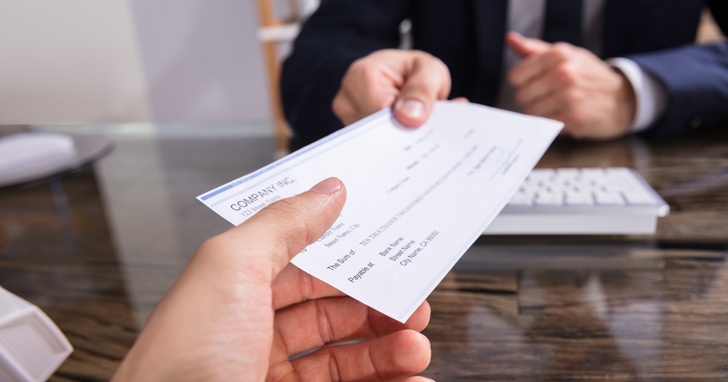Learn
Small Businesses and Paper Checks

Despite the popularity of electronic payment methods — from tapping a card or smart phone at the point of sale to entering account information to pay with a few clicks online — 63 percent of small businesses still accept checks1 from their customers.
Among those doing transactions with paper checks are brick-and-mortar and mail order retail companies, as well as medical offices, general contractors, architects, law firms, and other professional services that tend to bill customers and receive lots of payments by mail.
 To better manage your cash flow, design a process for handling paper checks that allows you to access check funds as soon as possible.
To better manage your cash flow, design a process for handling paper checks that allows you to access check funds as soon as possible.
If you're the owner of a small company, you have plenty on your plate just building up the business. That means you need a process for handling paper checks that runs as efficiently as possible. You also need a system that helps you manage the risks of fraudulent, lost, or stolen checks, and allows you to access check funds as soon as possible, to better manage your cash flow.
Follow these practices for trouble-free check handling.
Create a check acceptance policy
Develop a standard set of rules for customers who pay by check, and make sure that all customers and employees are aware of this policy. Whatever policy you set, it should address these key points:
- Whether you generally accept checks or require authorization in each case.
- Whether you require identification — and, if so, what type.
- What types of checks, if any, are not accepted (could include third-party, out-of-area or government checks, for example).
- Fee assessed for returned checks.
- Requirements for the preprinted info on the check. (The safest policy is to require the account holder's name, address and account number to be preprinted on the check by the financial institution.)
- How much the check can be made out for. (The safest policy is only to allow checks be made out for the exact amount of the purchase.)
When you design your check acceptance policy, be sure your identification requirements comply with state laws. While mandating that customers present a driver's license or other photo ID at the point of sale is generally legal, some states forbid requiring them to show a credit card2 to pay by check.
Train staff members on how to handle check payments properly, including what printed information they need to verify, what the process for verification is, what additional information they should write on each check, and how they should safely store checks.
Establish a standard depositing routine
It's also essential to create and follow a standard system for depositing paper checks, including who will be responsible for that task, when it should be done, and what steps should be taken to safeguard the checks until they can be deposited.
If you have a business that receives a high volume of paper checks, finding a way to make check depositing easier and less time-consuming should be a top priority. The ability to snap a picture of a check with a smart phone and immediately transmit it for deposit has been a game changer in personal banking. Business owners can now access their own version of remote deposit, using a special scanner purchased directly from their bank or another vendor that their bank approves.
By cutting out bank trips, remote deposit saves you and your staff time, letting your business operate more efficiently. It also can improve your cash flow by getting money into its account more quickly.
Decide how to deal with bounced checks
No matter how carefully you execute your check handling procedure, you will inevitably have some checks returned for insufficient funds. To minimize the negative impact on your business, you need a plan in place to recover those payments.
Your first step might be to call the customer to discuss the returned check and how they will make good on the payment. Be aware of any applicable state laws governing communications related to debt collection,3 which may include prohibitions against calling during certain hours or even restrictions on what you can say during the call. If you are unable to resolve the issue by phone, sending a collection letter might be the logical next step before possibly turning the case over to a collection agency or small claims court.
Your bank may have a system in place for handling returned checks. Synovus has a Check Recovery service that helps business owners recover these funds.
If you're ready to streamline your handling of paper checks, call or visit your nearest Synovus Branch to learn more about Remote Express Deposit (RED) and other services offered to help you manage your receivables.
Important Disclosure Information
This content is general in nature and does not constitute legal, tax, accounting, financial or investment advice. You are encouraged to consult with competent legal, tax, accounting, financial or investment professionals based on your specific circumstances. We do not make any warranties as to accuracy or completeness of this information, do not endorse any third-party companies, products, or services described here, and take no liability for your use of this information.
- Payments Journal, “What Percent of Small Businesses Accept Cash?" Published October 29, 2019, accessed November 19, 2019. https://www.paymentsjournal.com/what-percent-of-small-businesses-accept-cash/ Back
- FindLaw, “Payment and Collection Options for Your Small Business," Accessed November 18, 2019. https://smallbusiness.findlaw.com/business-finances/accepting-cash-and-checks.html Back
- FindLaw, “Payment and Collection Options for Your Small Business," Accessed November 18, 2019. https://smallbusiness.findlaw.com/business-finances/accepting-cash-and-checks.html Back
Do you have questions or ideas?
Share your thoughts about this article or suggest a topic for a new one
